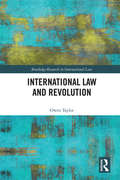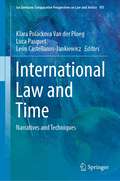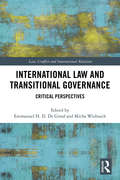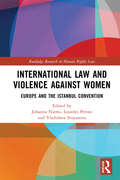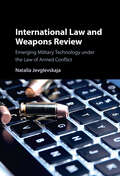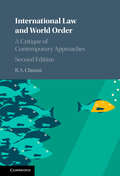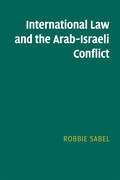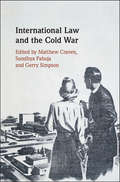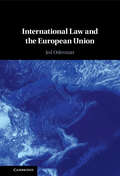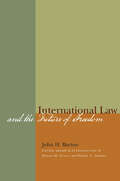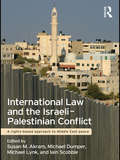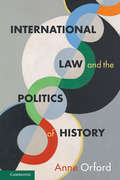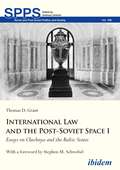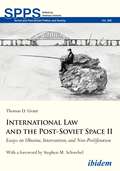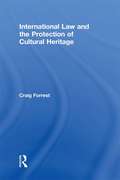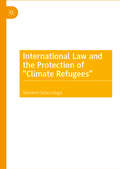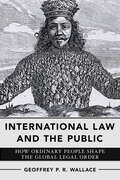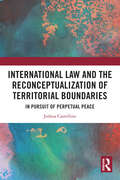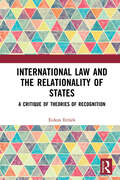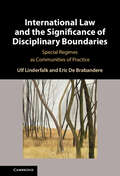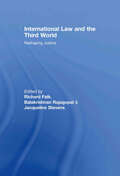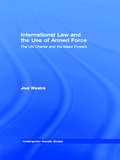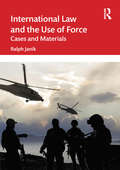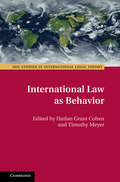- Table View
- List View
International Law and Revolution (Routledge Research in International Law)
by Owen TaylorThis book explores the historical inter-relations between international law and revolution, with a focus on how international anti-capitalist struggle plays out through law. The book approaches the topic by analysing the meaning of revolution and what revolutionary activity might look like, before comparing this with legal activity, to assess the basic compatibility between the two. It then moves on to examine two prominent examples of revolutionary movements engaging with international law from the twentieth century; the early Soviet Union and the Third World movement in the nineteen sixties and seventies. The book proposes that the ‘form of law’, or its base logic, is rooted in capitalist social relations of private property and contract, and that therefore the law is a particularly inhospitable place to advance revolutionary breaks with established distributions of power or wealth. This does not mean that the law is irrelevant to revolutionaries, but that turning to legal means comes with tendencies towards conservative outcomes. In the light of this, the book considers the possibility of how, or whether, international law might contribute to the pursuit of a more egalitarian future. International Law and Revolution fills a significant gap in the field of international legal theory by offering a deep theoretical reflection on the meaning of the concept of revolution for the twenty-first century, and its link to the international legal system. It develops the commodity form theory of law as applied to international law, and explores the limits of law for progressive social struggle, informed by historical analysis. It will therefore appeal to students and scholars of public international law, legal history, human rights, international politics and political history.
International Law and Time: Narratives and Techniques (Ius Gentium: Comparative Perspectives on Law and Justice #101)
by Klara Polackova Van der Ploeg Luca Pasquet León Castellanos-JankiewiczThis book explores the close, complex and consequential – yet to a large extent implicit – relationship between international law and time. There is a conspicuous discrepancy between international law’s technical preoccupation with the mechanics of temporal rules and the absence of more foundational considerations of how time – both as an irrepressible physical dimension manifesting in the passage of time, and as a social construct shaped by diverse social and cultural factors – impacts and interacts with international law. Divided into five parts and 21 chapters, this book explores key aspects of the relationship between international law and time and puts the spotlight on time’s fundamental significance for international law as a legal order and as a discipline. Pursuing diverse approaches to international law, the authors consider the notion, significance, manifestations, uses and implications of time in international law in a wide range of contexts, and offer insights into the various ways in which international law and international lawyers cope with time, both in terms of constructing narratives and in devising and employing particular legal techniques.
International Law and Transitional Governance: Critical Perspectives (Law, Conflict and International Relations)
by Emmanuel H. D. De Groof Micha WiebuschThis volume examines the role of international law in shaping and regulating transitional contexts, including the institutions, policies and procedures that have been developed to steer constitutional regime changes in countries affected by catalytic events. The book offers a new perspective on the phenomenon of conflict-related transitions, whereby societies are re-constitutionalized through a set of interim governance arrangements subject to variable degrees of internationalization. Specifically, this volume interrogates the relevance, contribution and perils of international law for this increasingly widespread phenomenon of inserting an auxiliary phase between two ages of constitutional government. It develops a more nuanced understanding of the various international legal discourses surrounding conflict- and political crisis-related transitional governance by studying the contextual factors that influence the transitional arrangements themselves, with a specific focus on international aspects, including norms, actors and related forms of expertise. In doing so, the book builds an important bridge between comparative constitutional law and international legal scholarship in the practical and highly dynamic terrain of transitional governance. This book will be of much interest to practitioners and students of international law, diplomacy, mediation, security studies and International Relations.
International Law and Violence Against Women: Europe and the Istanbul Convention (Routledge Research in Human Rights Law)
by Vladislava Stoyanova Johanna Niemi Lourdes PeroniThis book offers an in-depth and critical analysis of the Istanbul Convention, along with discussions on its impact and implications. The work highlights the place of the Convention in the landscape of international law and policies on violence against women and equality. The authors argue that the Convention with its emphasis on integrated and comprehensive policies has an important role in promoting equality, but they also note the debates on “genderism” that the Convention has triggered in some member states. The book analyses central concepts of the Convention, including violence, gender and due diligence. It takes up major commitments of the parties to the Convention, including support and services to victims, criminal law provisions and protection of migrant women against violence. The book thus makes a major contribution to the development of national laws, policies and practice. It provides a valuable guide for policy-makers, students and academics in international human rights law, criminal and social law, social policy, social work and gender studies.
International Law and Weapons Review: Emerging Military Technology under the Law of Armed Conflict
by Natalia JevglevskajaInternational law requires that, before any new weapon is developed, purchased or modified, the legality of its use must be determined. This book offers the first comprehensive and systemic analysis of the law mandating such assessments – Article 36 of the 1977 Additional Protocol I to the Geneva Conventions. Underpinned by empirical research, the book explores the challenges the weapons review authorities are facing when examining emerging military technology, such as autonomous weapons systems and (autonomous) cyber capabilities. It argues that Article 36 is sufficiently broad to cover a wide range of military systems and offers States the necessary flexibility to adopt a process that best suits their organisational demands. While sending a clear signal that law should not simply follow technological developments, but rather steer them, the provision has its limits, however, which are shaped and defined by the interpretative decisions made by States.
International Law and World Order: A Critique of Contemporary Approaches
by Chimni B. S.This collection of essays explores different dimensions of the relationship between the third world and international law. The topics covered include third world approaches to international law, non-state actors and developing countries, feminism and the third world, foreign investment, resistance and international law, and territorial disputes and native peoples. It is a further contribution to the work done by scholars intent on elaborating what might be termed Third World Approaches to International Law (TWAIL). This initiative seeks to continue and further develop the important work that has been done over many decades, particularly by scholars and jurists from the third world, to construct an international law which is sensitive to the needs of third world peoples. This body of scholarship has attempted to extend and expand the concerns and materials of international law. The essays in this volume are animated by these same motives at a time when unprecedented issues confront third world peoples, particularly since the contemporary international system appears to be disempowering third world peoples, intensifying inequality between the North and the South, and indeed, importantly, within the North and the South. TWAIL scholars attempt to look afresh at the history of colonial international law, engage previous trends in third world scholarship in international law, take cognizance of the dramatic changes which have characterized the body of international law in the last few decades from the perspective of third world peoples, record their resistance to unjust and oppressive international laws, and advance new approaches that address their needs and concerns. These are the broad themes and concerns which animate this collection of essays.
International Law and the Arab-Israeli Conflict
by Robbie SabelDrawing upon Robbie Sabel's first-hand involvement with many legal negotiations in the Arab-Israeli conflict, International Law and the Arab-Israeli Conflict examines international law in relation to the conflict by analysing its major events and agreements, both historical and contemporary. Outlining the role of international law from the collapse of the Ottoman Empire until the present day, it considers the legal elements of the various peace treaties that Israel has signed with its neighbouring Arab States. Using his expertise as a professor, practitioner and ambassador, Sabel endeavours to represent both sides of the conflict, offering a wealth of counter-arguments and adding his own legal interpretations. With this valuable resource, students and researchers working within a range of disciplines can fully appreciate the role of international law in the Arab-Israeli conflict.
International Law and the Arctic
by Michael Byers James BakerClimate change and rising oil prices have thrust the Arctic to the top of the foreign policy agenda and raised difficult issues of sovereignty, security and environmental protection. Improved access for shipping and resource development is leading to new international rules on safety, pollution prevention and emergency response. Around the Arctic, maritime boundary disputes are being negotiated and resolved, and new international institutions, such as the Arctic Council, are mediating deep-rooted tensions between Russia and NATO and between nation states and indigenous peoples. International Law and the Arctic explains these developments and reveals a strong trend towards international cooperation and law-making. It thus contradicts the widespread misconception that the Arctic is an unregulated zone of potential conflict.
International Law and the Cold War
by Anna Saunders Gerry Simpson Sundhya Pahuja Matthew CravenInternational Law and the Cold War is the first book dedicated to examining the relationship between the Cold War and International Law. The authors adopt a variety of creative approaches - in relation to events and fields such as nuclear war, environmental protection, the Suez crisis and the Lumumba assassination - in order to demonstrate the many ways in which international law acted upon the Cold War and in turn show how contemporary international law is an inheritance of the Cold War. Their innovative research traces the connections between the Cold War and contemporary legal constructions of the nation-state, the environment, the third world, and the refugee; and between law, technology, science, history, literature, art, and politics.
International Law and the European Union
by Jed OdermattThe European Union plays a significant role in international affairs. International Law and the European Union examines the impact this has had on public international law by integrating perspectives from both EU law and international law. Its analysis focuses on fields of public international law where the EU has had an influence, including customary international law, the law of treaties, international organizations, international dispute settlement, and international responsibility. International Law and the European Union shows how the EU has had a subtle but significant impact on the development of international law and how the international legal order has developed and adjusted to accommodate the EU as a distinct legal actor. In doing so, it contributes to our understanding of how international law addresses legal subjects other than States.
International Law and the Future of Freedom
by John H. Barton edited by Helen M. Stacy Henry T. GreelyInternational Law and The Future of Freedom is the late John Barton's exploration into ways to protect our freedoms in the new global international order. This book forges a unique approach to the problem of democracy deficit in the international legal system as a whole—looking at how international law concretely affects actual governance. The book draws from the author's unparalleled mastery of international trade, technology, and financial law, as well as from a wide array of other legal issues, from espionage law, to international criminal law, to human rights law. The book defines the new and changing needs to assert our freedoms and the appropriate international scopes of our freedoms in the context of the three central issues that our global system must resolve: the balance between security and freedom, the balance between economic equity and opportunity, and the balance between community and religious freedom. Barton explores the institutional ways in which those rights can be protected, using a globalized version of the traditional balance of powers division into the global executive, the global legislature, and the global judiciary.
International Law and the Israeli-Palestinian Conflict: A Rights-Based Approach to Middle East Peace
by Susan M. AkramThe Israeli-Palestinian conflict has long been intertwined with, and has had a profound influence on, the principles of modern international law. Placing a rights-based approach to the Israeli-Palestinian conflict at the centre of discussions over its peaceful resolution, this book provides detailed consideration of international law and its application to political issues. Through the lens of international law and justice, the book debunks the myth that law is not useful to its resolution, illustrating through both theory and practice how international law points the way to a just and durable solution to the conflict in the Middle East. Contributions from leading scholars in their respective fields give an in-depth analysis of key issues that have been marginalized in most mainstream discussions of the Israeli-Palestinian conflict: Palestinian refugees Jerusalem security legal and political frameworks the future of Palestine. Written in a style highly accessible to the non-specialist, this book is an important addition to the existing literature on the subject. The findings of this book will not only be of interest to students and scholars of Middle Eastern politics, International Law, International Relations and conflict resolution, but will be an invaluable resource for human rights researchers, NGO employees, and embassy personnel, policy staffers and negotiators.
International Law and the Politics of History
by Anne OrfordAs the future of international law has become a growing site of struggle within and between powerful states, debates over the history of international law have become increasingly heated. International Law and the Politics of History explores the ideological, political, and material stakes of apparently technical disputes over how the legal past should be studied and understood. Drawing on a deep knowledge of the history, theory, and practice of international law, Anne Orford argues that there can be no impartial accounts of international law's past and its relation to empire and capitalism. Rather than looking to history in a doomed attempt to find a new ground for formalist interpretations of what past legal texts really mean or what international regimes are really for, she urges lawyers and historians to embrace the creative role they play in making rather than finding the meaning of international law.
International Law and the Post-Soviet Space I: Essays on Chechnya and the Baltic States (Soviet and Post-Soviet Politics and Society #199)
by Thomas D. GrantThe regions that once comprised the Soviet Union have been the scene of crises with serious implications for international law. Some of these, like the separatist conflict in Chechnya, date to the time of the dissolution of the USSR. Others, like Russia’s forcible annexation of Crimea and intervention in Ukraine’s Donbas, erupted years later. The seizure of Estonia, Latvia, and Lithuania, which took place long before, would trouble Soviet-western relations for the Cold War’s duration and gained new relevance when the Baltic States reemerged in the 1990s. The fate of Ukraine notwithstanding, the Budapest Memorandum of 1994 complicates future efforts at nuclear nonproliferation. Legal proceedings in connection with events in the post-Soviet space brought before the International Court of Justice and under investment treaties or the UN Convention on the Law of the Sea may be steps toward the resolution of recent crises—or tests of the resiliency of modern international law.
International Law and the Post-Soviet Space II: Essays on Ukraine, Intervention, and Non-Proliferation (Soviet and Post-Soviet Politics and Society #200)
by Thomas D. GrantThis volume deals with legal issues concerning Russia’s annexation of Crimea and intervention in the Donbas, so-called ‘frozen conflicts’ and ‘hybrid warfare,’ the use of courts and tribunals to address armed aggression, and the implications of recent events for the security guarantees connected to nuclear nonproliferation. Continuing from the first volume, which contains Parts One and Two on Chechnya and the Baltic States, this book is comprised of Part Three—Ukraine and other Successor States: Territorial Integrity and its Challengers in the Post-Soviet Space; Part Four—Intervention and International Law; Part Five—Legal Proceedings and Unlawful Claims; and Part Six—Non-Proliferation after Budapest.
International Law and the Protection of Cultural Heritage (Routledge Studies in Cultural Heritage and International Law)
by Craig ForrestThe world’s cultural heritage is under threat from war, illicit trafficking, social and economic upheaval, unregulated excavation and neglect. Over a period of almost fifty years, the United Nations Educational, Scientific and Cultural Organisation has adopted five international conventions that attempt to protect this cultural heritage. This book comprehensively and critically considers these five UNESCO cultural heritage conventions. The book looks at the conventions in the context of recent events that have exposed the dangers faced by cultural heritage, including the destruction of cultural heritage sites in Iraq and the looting of the Baghdad museum, the destruction the Buddhas of Bamiyan in Afghanistan, the salvage of artefacts from the RMS Titanic and the illicit excavation and trade in Chinese, Peruvian and Italian archaeological objects. As the only existing work to consider all five of the cultural heritage conventions adopted by UNESCO, the book acts as an introduction to this growing area of international law. However, the book does not merely describe the conventional principles and rules, but, critically evaluates the extent to which these international law principles and rules provide an effective and coherent international law framework for the protection of cultural heritage. It is suitable not only for those schooled in the law, but also for those who work with cultural heritage in all its manifestations seeking a broad but critical consideration of this important area of international law.
International Law and the Protection of “Climate Refugees”
by Giovanni SciaccalugaThis book studies the topic of forced climate migrants (commonly referred to as “climate refugees”) through the lens of international law and identifies the reasons why these migrants should be granted international protection. Through an analysis focused on climate change and human rights international law, it points out the legal principles and rules upon which an international obligation to protect persons forced to migrate due to climate change is emerging. Sciaccaluga advocates for a state obligation to protect climate migrants when their origin countries have become extremely environmentally fragile due to climate change—to the point of becoming unable to guarantee the exercise of inalienable human rights in their territories. Turning to the future, this book then investigates the current elements on which a “forced climate migrants law” could be built, ultimately arguing for the duty to provide some form of assistance to forced climate migrants in a third state within the international legal system.
International Law and the Public: How Ordinary People Shape the Global Legal Order
by Geoffrey P. WallaceIn International Law and the Public, Geoffrey P.R. Wallace investigates the public as a crucial, often overlooked, actor in international law. He asks just who is it that counts in the operation of the international legal order. Defying conventional wisdom that sees governments, leaders, generals, lawyers, or elites from the upper echelons of society as the main international legal players, Wallace advances a "popular international law" where ordinary people are considered important legal actors in their own right alongside the usual focus on elites. Far from powerless or unwitting, publics possess both the cognitive and material capacities to understand and contribute to the intricacies of international legal rules. Combining rigorous theorizing with wide-ranging evidence, International Law and the Public is an account of an international legal politics from below, taking seriously the place of ordinary people in international affairs.
International Law and the Reconceptualization of Territorial Boundaries: In Pursuit of Perpetual Peace
by Joshua CastellinoThis book critically analyzes the state-based regime of international law, eliciting its colonial and decolonial origins and proposing a new sub-regional basis for dealing with contemporary global challenges.Since 1648, public international law has taken many steps to maintain peace and establish a just order. The State is deemed central to each of these efforts. Yet modern challenges, such as environmental mitigation, mass migration, and the need to stimulate economic growth, overwhelm the State. Could a regional approach to these questions, achieved in conjunction with strong sub-national local governance, establish a more effective framework for systemic change? Drawing on a history of colonization and decolonization, while scrutinizing decisions made about the imposition of the State on the basis of colonial boundaries, this multidisciplinary work analyses why current challenges are unlikely to be adequately addressed through existing governance structures. In response, it advocates for a sub-regional, transnational approach, drawing on analyses of pre-colonial shared histories and contemporary population ethnographies unfettered by hegemonic boundary drawing. The book argues that collaboration across such frontiers in the face of climate and other challenges may offer more feasible approaches to the pursuit of peace than the unquestioned maintenance of state-based structures of inherited privilege.This book will appeal to scholars and others with interests in international law, international relations, and international politics, as well as in the history and politics of colonialism.
International Law and the Relationality of States: A Critique of Theories of Recognition
by Erdem ErtürkThis book critically engages with theories of the recognition of states under international law. Demonstrating that recognition is a constitutive relation that is imperative for the construction of international subjects, the book argues that prevalent theories of recognition fall short of accommodating this imperative. The book traces the source of this shortcoming to Vattel’s notion of absolute sovereignty. A paradox pertains to this notion as absolutely independent states seemingly come into being in a community which sets the law that determines statehood. The book shows how this paradox is reproduced in constitutive theorists’ idea of recognition as a sovereign gesture of consent and declarative theorists’ perception that states can come into being on a singular basis, without any need for interaction. This necessitates a rethinking of the role of recognition in a way that circumvents the problems generated by the notion of absolute independence, whilst accommodating the relational element of coming into being. To achieve this purpose, the book draws upon Hegel’s theory of recognition, supplementing it with Bataille’s and Derrida’s critical readings of Hegel’s thought. In this respect, the book departs from the restrictive economy of recognition that constantly recreates a paradoxical perception of sovereignty, elaborating a more general economy of recognition that accommodates the notion of subjects in flux. This critical engagement with a key notion in international law will appeal to legal and political theorists, as well as scholars and students in international relations.
International Law and the Significance of Disciplinary Boundaries: Special Regimes as Communities of Practice
by Ulf Linderfalk Eric De BrabandereOver the last thirty or so years, international law and legal practice have become increasingly more specialized and diversified. These developments come with an increasingly divergent legal practice, in what has been coined as 'special regimes'. This book proposes a new understanding of the concept of a special regime to explain why specialists in different fields of international law do similar things differently. It argues that special regimes are best conceived as communities of practice, in the sense of Etienne Wenger's theory of communities of practice. It explores how the theory of communities of practice translates to the context of international law and the concept of a special regime. The authors draw up an innovative methodology to investigate their theory, focused on the conduct of community members, and apply this method to selected case studies, offering an original approach to the understanding of the special regimes in international law.
International Law and the Third World: Reshaping Justice (Routledge Research in International Law)
by Jacqueline Stevens Richard Falk Balakrishnan RajagopalThis volume is devoted to critically exploring the past, present and future relevance of international law to the priorities of the countries, peoples and regions of the South. Within the limits of space it has tried to be comprehensive in scope and representative in perspective and participation. The contributions are grouped into three clusters to give some sense of coherence to the overall theme: articles by Baxi, Anghie, Falk, Stevens and Rajagopal on general issues bearing on the interplay between international law and world order; articles highlighting regional experience by An-Na’im, Okafor, Obregon and Shalakany; and articles on substantive perspectives by Mgbeoji, Nesiah, Said, Elver, King-Irani, Chinkin, Charlesworth and Gathii. This collective effort gives an illuminating account of the unifying themes, while at the same time exhibiting the wide diversity of concerns and approaches.
International Law and the Use of Armed Force: The UN Charter and the Major Powers (Contemporary Security Studies)
by Joel WestraSince the UN Charter came into effect in 1945, there have been numerous incidents in which one or more of the five major powers (at least arguably) violated the Charter's Article 2(4) prohibition of force. Such incidents notwithstanding, this book demonstrates how the Charter restrains the major powers' military actions. As an instrument of international order, the Charter provides a framework of legal rules restricting the use of armed force. Although these rules are subject to auto-interpretation by the major powers (as a consequence of their veto), they create an expectation of compliance that subjects the major powers' military actions to international scrutiny. To reduce the likelihood of resistance from states threatened by such actions, major powers exercise prudential restraint, altering the manner and timing of their military actions in accordance with the legal arguments offered to justify those actions as consistent with the Charter and therefore not threatening to the existing international order. The book evaluates the efficacy of the Charter using large-N methods and five case studies: US intervention in the Caribbean, 1953–61; Anglo- French intervention in Egypt, 1956; Soviet intervention in Hungary, 1956; US–British intervention in Iraq, 1990–98; and US–British intervention in Iraq, 1999–2003. The book's extensive focus on the two Iraq cases provides a basis for timely evaluation of the continuing salience and possible reforms of the UN Charter system. This book will be of much interest to students of security studies, the UN, international law, and international relations.
International Law and the Use of Force: Cases and Materials
by Ralph JanikThis book introduces key issues on the use of force while also providing a detailed analysis of technological developments and recent legal discussions in the field. The author examines areas such as support for rebel groups, the concept of humanitarian intervention, the Responsibility to Protect and recent conversations around the fight against the "Islamic State" in a clear and accessible manner, through a thorough presentation of relevant cases and materials. This book is essential reading for students studying force and its intersection with international law.
International Law as Behavior (ASIL Studies in International Legal Theory)
by Harlan Grant Cohen Timothy MeyerThis volume includes chapters from an exciting group of scholars at the cutting edge of their fields to present a multi-disciplinary look at how international law shapes behavior. Contributors present overviews of the progress established fields have made in analyzing questions of interest, as well as speculations on the questions or insights that emerging methods might raise. In some chapters, there is a focus on how a particular method might raise or help answer questions, while others focus on a particular international law topic by drawing from a variety of fields through a multi-method approach to highlight how these fields may come together in a single project. Still others use behavioral insights as a form of critique to highlight the blind spots and related mistakes in more traditional analyses of the law. Throughout this volume, authors present creative, insightful, challenges to traditional international law scholarship.
